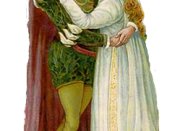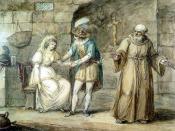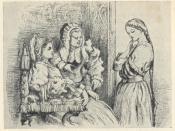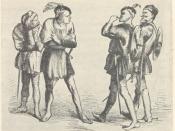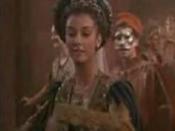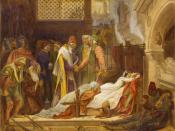When we are first introduced to Romeo in the play, we already know a little about him, and of his family background. He is being discussed by his parents and his cousin, Benvolio, all of whom are concerned by his reclusive, depressed manner. We learn that he has been acting in a manner obviously out of character to him, going on solitary walks early in the morning
"with tears augmenting the fresh morning's dew"
and shutting himself away from his family. At this point, neither the reader nor characters know the cause of his melancholy. In the middle of the conversation, however, Romeo appears, and Benvolio resolves to discover what is tormenting him. As they talk, it becomes clear that Romeo's problem concerns his love life, and our first impression of him is of a melodramatic, world-weary teenager. He speaks in riddles at first, not directly seeming to converse with Benvolio, but more to be indulging his own need for attention, in his long, dramatic speeches.
"O me! What fray was here? Yet tell me not, for I have heard it all."
which then continues into a long soliloquy on the contradictory features of love. At this point, Romeo appears to be spending a little too much time delivering riveting oratory to actually be as depressed as he would have himself and others believe - instead of stating simply real feelings, he is fancifully dramatising his misery, a romantic notion of how he should feel rather than his true feelings. It is difficult to like Romeo as a character at this stage, as he seems pathetic and self-absorbed, caught up in his own whimsical ideas rather than the situation around him. Finally Romeo tells Benvolio the reason for his fuss - the lady he supposes he loves, Rosaline, has sworn to die a virgin and will have nothing to do with him. Benvolio suggests he look elsewhere for love, but Romeo believes it impossible he could love someone else, saying
"Thou canst not teach me to forget."
However, despite all this protestations that he can never cease to love Rosaline, Romeo completely changes his mind very soon. After discovering the Capulets are having a party that Rosaline is attending, his friends persuade him to go, and there he first sees Juliet. Immediately all thought of Rosaline leaves his mind and even before he has spoken to her, he is besotted with her beauty alone and begins to rhapsodise about her beauty rather than Rosaline's.
"I ne'er saw true beauty till this night."
This comes as a slight shock to the reader after all his moping over Rosaline, and make Romeo seem insincere, unreliable and flighty, caring for no one but himself. He proceeds to unashamedly chat up Juliet, resulting in the two kissing. He is at once convinced he loves Juliet and decides that he never loved Rosaline.
Despite this fickleness, we then begin to see a significant change in Romeo - when he climbs into Juliet's garden after the party, instead of his usual theatrical speeches, when he first see her he forgets his usual habits, and says unthinkingly,
"It is my lady, O it is my love: O that she knew she were!"
Not particularly eloquent, and Romeo's first genuinely heartfelt line.
His love for Juliet draws another change - after their marriage, he becomes part of Juliet's family and so her cousin Tybalt is his cousin also. The feud between their two families leads to Tybalt challenging Romeo to a duel, yet Romeo, with no regard to his family's honour or his own, refuses. The reader's opinion of Romeo at this point can't help but change as he himself changes - it seems his marriage has made him grow up, and become more aware of the situation he was born into and instead of thinking only of himself, he thinks of Juliet and how it would hurt her if Tybalt or he were killed. He really does seem to have realised the meaning of love at this point and to have given up his former selfishness.
However when he refuses to fight, Mercutio is furious at what he believes to be Romeo's cowardice, fights, and is killed by Tybalt, in Romeo's place. This results in a complete change in Romeo's attitude again, and he forgets all about Juliet and becomes focussed instead only on revenge for Mercutio, killing Tybalt. I think this is probably the most considerable change in Romeo throughout the play, as I don't believe the pathetic spectacle we met at the beginning of the play would have been capable of killing a man. While this is obviously not necessarily a good change in character, it shows that he has finally been pulled from his childish dream-world into reality.
He is still his pitiful, petty self however, in that when he learns of his punishment for Tybalt's murder, he still rants and raves. Not only is he still not man enough to accept the consequences of his actions, he complains of his discontent with being told to leave Verona - no, he'd rather be killed than move a few miles away. Mature. It seems Romeo's momentary change into sincerity has vanished no sooner than it came, to be replaced with his former petulant love of the dramatic.
It seems the changes in Romeo have all been reversed and he now offers to stab himself, to selfishly end his suffering and heighten everyone else's. While he doesn't kill himself just then, he still eventually resorts to that way out, showing that at the end of his life he was as weak and cowardly as at the beginning of the play.
It could be argued that, throughout the course of the play, Romeo changes in three respects - his changed heart from Rosaline to Juliet means he learns the meaning of true love, his change from lyrical speeches to heartfelt, simple statements means he has become genuine and stopped playing up to his dramatic nature, and his eagerness to thrust aside the quarrel between the Montagues and the Capulets means he has grown up and become less selfish.
However I disagree. The changes in Romeo I feel are only fleeting changes, present only for as long as it suits Romeo for them to be there. As for his love for Juliet is concerned, I think it is exactly the same as his so-called love for Rosaline, and would have vanished just as quickly had she not loved him, and someone else had come along. His brief spell of openness and genuine statements disappeared as quickly as his happiness and his inability to be content with his lot is always accompanied by this self-absorbed sympathy for all the terrible hardships he fancies he faces. Yet his reaction to killing two men and his wife dying is the same as his reaction to a woman he doesn't know telling him she doesn't love him - he sees no difference between the false hardships of his imagination to real life tragedies. His frequent thoughts of suicide, eventually successful, show he is as selfish as he always was, and has learnt nothing from his experiences.
So I don't think Romeo's character changes in the play though his situation changes to indulge his weaknesses even more.
